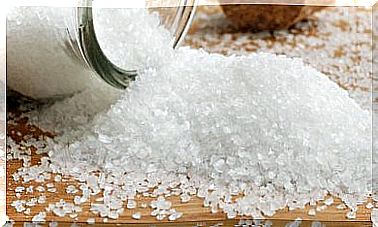Is There A Connection Between Gluten And Fibromyalgia?

Fibromyalgia is a health problem that is characterized by muscle pain and persistent episodes of fatigue. Is there a link between gluten and fibromyalgia? Read more and find out!
The people who struggle with it experience a tension and tenderness in most of their body. They also experience other irregular symptoms such as stiffness, headache and a tingling in the hands and feet.
It is considered to be a chronic condition. And it is believed that almost 3% of the population suffers from it. It affects women 10 times more often than men.
The most serious cases occur in adults and patients with diseases such as rheumatoid arthritis, arthritis, lupus and aging of the spine.
Some experts believe that the root cause is genetically determined. But it has also been linked to other factors including trauma from accidents, physical activity and other illnesses.
In fact, in a recent study, it was discovered that patients with this condition may experience complications simply by ingesting gluten.
This substance is found in wheat. It increases one’s level of inflammation in the body and affects the relief of symptoms.
What is the relationship between gluten and fibromyalgia?

In a study published by BMC Gastroenterology , it was found that a gluten-free diet leads to a significant improvement in women who have been diagnosed with irritable bowel syndrome and fibromyalgia.
Although they recognize that the cause of fibromyalgia remains a mystery to healthcare professionals, the results are promising for the treatment of those who suffer from it.
Their study suggests that the process of inflammation of the intestinal tract associated with gluten may contribute to the onset or increase of hypersensitivity in the central nervous system. This is mainly responsible for the development of fibromyalgia.
Gluten is a protein found in wheat, rye, barley and other grains.
Its connection to inflammation has been studied frequently. This is because people who are hypersensitive to it often get an inflamed reaction.
The link between fibromyalgia and gluten comes from inflammation in the cells of the body. This affects joints, muscles and other tissues.
Many people are not even aware that they are gluten intolerant. This can greatly increase the complications of this condition.
This is why experts recommend that they remove these foods from their diet as a contribution to the common treatment of this condition.
What other precautions can be taken to combat fibromyalgia?
In addition to removing all foods that contain gluten from your diet, one can also consider other important caveats to control this disease.
Changing your eating habits and getting regular exercise is an essential part of dealing with it.
Get more magnesium

Eating foods rich in magnesium helps protect one’s muscles and tendons by reducing tension and joint pain.
This involves:
- Spinach
- Salad
- Asparagus
- Pumpkin seeds
- Molasses
Take vitamin D.
A deficiency of vitamin D has been linked to the onset of complications in patients with fibromyalgia.
An adequate intake of this vitamin can reduce episodes of chronic pain and increase one’s physical performance.
Some sources of vitamin D are:
- Fat fish
- Beef liver
- Cheese
- Egg yolks
- Mushrooms
- Vitamin D-enriched milk
Intake calcium
Foods rich in calcium reduce episodes of muscle cramps and strengthen bone and joint health.
You can get calcium from:
- Milk
- Cheese
- Yogurt
- Soy milk
- Prayers
- Broccoli
Physical activity

Getting exercise improves one’s blood circulation, tones muscle groups and helps one maintain a healthy weight to avoid further overload of one’s body.
Activities such as walking, cycling and swimming are ideal for patients with this condition.
Massage
Massage with relaxed oils reduces pain and other symptoms that are the hallmarks of this condition.
The key is to apply the appropriate pressure to avoid muscle damage. Get help from a professional.
To conclude, although scientific studies are required to determine the link between gluten and fibromyalgia, adjusting one’s diet is an excellent way to control the symptoms.









